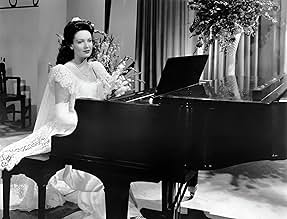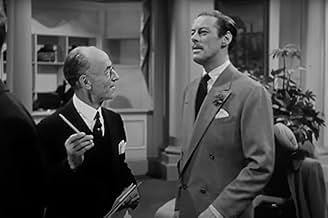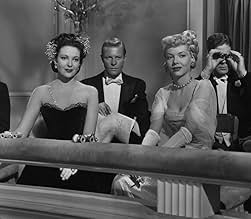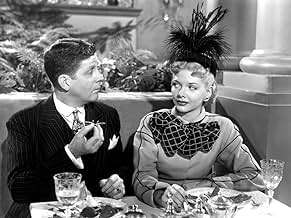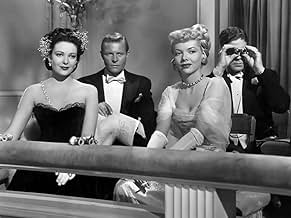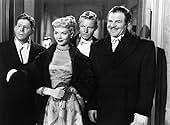CALIFICACIÓN DE IMDb
7.4/10
6.1 k
TU CALIFICACIÓN
Agrega una trama en tu idiomaA man dreams of revenge when he suspects his wife is unfaithful.A man dreams of revenge when he suspects his wife is unfaithful.A man dreams of revenge when he suspects his wife is unfaithful.
- Dirección
- Guionista
- Elenco
- Premios
- 1 premio ganado en total
Al Bridge
- House Detective
- (as Alan Bridge)
Abdullah Abbas
- Concert Attendee
- (sin créditos)
Pati Behrs
- Minor Role
- (sin créditos)
George Beranger
- Maître d'hôtel
- (sin créditos)
Evelyn Beresford
- Madame Pompadour
- (sin créditos)
Georgia Caine
- Dowager in Concert Box
- (sin créditos)
James Carlisle
- Concert Attendee
- (sin créditos)
Harry Carter
- Reporter
- (sin créditos)
Bill Cartledge
- Page Boy
- (sin créditos)
- Dirección
- Guionista
- Todo el elenco y el equipo
- Producción, taquilla y más en IMDbPro
Opiniones destacadas
Unfaithfully Yours (1948)
I've never quite loved Preston Sturges as a director or Rex Harrison as an actor, so having the two of them together here didn't bode well, and I thought I'd announce my bias. And sure enough, on this second viewing I was reminded of a kind of crisp calculation that both of them have. Sturges makes amazing movies, no question, and the best of them (Palm Beach Story is my favorite) are hilarious classics. To see this one for what it offers you might first see a classic Sturges screwball from 1941 or 1942. But even those are clinical at heart (if they have a heart), so it's a little like sipping a very dry, clean martini and getting drunk. Alone. No olives. Wit and sophistication do better in the hands of Cole Porter, somehow, but see for yourself.
Harrison the actor overcomes his harsh demeanor in a movie like My Fair Lady because the music and the style there give him some kind of liberty, but here he is supposed to be sympathetic in his demented cruelty, and I only wish him failure. He is, to be sure, plotting the death of his wife. Three times. And then the fourth, beyond the symphony podium, with its madcap bedlam. It's funny in that zany way you have to laugh at. And you will laugh.
I love classical music and like the structure of the film, but as usual with Sturges, this structure makes the whole process detached and too too clever. Sturges himself wrote the screenplay for this idea way back in 1932, and if it had been shot then, before the Hays code, before the real rise of screwball, we would have had a very different movie. But what we have here is admirable and interesting, for sure, if not the zinger it could have been with a different tilt.
I've never quite loved Preston Sturges as a director or Rex Harrison as an actor, so having the two of them together here didn't bode well, and I thought I'd announce my bias. And sure enough, on this second viewing I was reminded of a kind of crisp calculation that both of them have. Sturges makes amazing movies, no question, and the best of them (Palm Beach Story is my favorite) are hilarious classics. To see this one for what it offers you might first see a classic Sturges screwball from 1941 or 1942. But even those are clinical at heart (if they have a heart), so it's a little like sipping a very dry, clean martini and getting drunk. Alone. No olives. Wit and sophistication do better in the hands of Cole Porter, somehow, but see for yourself.
Harrison the actor overcomes his harsh demeanor in a movie like My Fair Lady because the music and the style there give him some kind of liberty, but here he is supposed to be sympathetic in his demented cruelty, and I only wish him failure. He is, to be sure, plotting the death of his wife. Three times. And then the fourth, beyond the symphony podium, with its madcap bedlam. It's funny in that zany way you have to laugh at. And you will laugh.
I love classical music and like the structure of the film, but as usual with Sturges, this structure makes the whole process detached and too too clever. Sturges himself wrote the screenplay for this idea way back in 1932, and if it had been shot then, before the Hays code, before the real rise of screwball, we would have had a very different movie. But what we have here is admirable and interesting, for sure, if not the zinger it could have been with a different tilt.
It is rare when a film is so funny that it will give me fits of belly laughter, and Unfaithfully Yours is one of them. Rex Harrison stars as an English aristocrat and eminent conductor who, despite being madly in love with his wife (played by Linda Darnell) realizes as a result of several misunderstandings that she may be cheating on him. While he is conducting a symphony concert he comes up with three different scenarios in his head of how to deal with her alleged duplicity. Actually carrying out these plans turns out to be an entirely different matter.
Preston Sturges is always an excellent writer and director, but his quick wit and double entendres are a revelation in this film. One almost has to watch it two or three times to get every comment uttered and facial expression portrayed by our protagonist (Harrison). His delivery is superb, sometimes almost funnier than the words he is saying. Darnell and the supporting cast provide excellent straight and slapstick moments. Dudley Moore starred in a remake of this film in the 80's which was also enjoyable, but having now seen this film, I highly recommend the original over the remake. It is an hour and a half of pure delight.
--Shelly
Preston Sturges is always an excellent writer and director, but his quick wit and double entendres are a revelation in this film. One almost has to watch it two or three times to get every comment uttered and facial expression portrayed by our protagonist (Harrison). His delivery is superb, sometimes almost funnier than the words he is saying. Darnell and the supporting cast provide excellent straight and slapstick moments. Dudley Moore starred in a remake of this film in the 80's which was also enjoyable, but having now seen this film, I highly recommend the original over the remake. It is an hour and a half of pure delight.
--Shelly
Rex Harrison is a temperamental conductor and Linda Darnell his younger, adoring wife in "Unfaithfully Yours," also starring Lionel Stander, Rudy Vallee, and Kurt Krueger. Harrison and his wife are so much in love, it's sickening. But thanks to interference from his brother-in-law (a subdued Rudy Vallee), Harrison begins to believe that while he was out of town, his beautiful wife (Darnell) was consorting with his secretary, Tony, played by blond, handsome Kurt Krueger. As he conducts the orchestra in concert that evening, Harrison imagines several scenarios - one in which he kills his wife and cleverly frames Tony for the murder; one in which he pays her off; and one where he challenges Tony to a game of Russian roulette. Of course, when he actually tries to carry them out, things don't go as he imagined.
This is a hilarious movie, with Harrison absolutely magnificent - and I might add, totally unlikable. One wonders if Darnell will stay with him once the bloom is off the rose. Lanky and sure of himself, though not particularly handsome, Harrison has a certain magnetism, not to mention a snappy way with a line. "Will I see you tonight at the concert?" Vallee asks him. "Yes!" Harrison yells. "I'm generally there on the nights when I conduct!" His last scene alone in the apartment is a scream, mainly because Harrison doesn't go for laughs but takes the whole thing very seriously and in character. Darnell is beautiful and appropriately cloying. Edgar Kennedy, as a classical music loving detective, has a wonderful scene with Harrison.
I haven't seen the remake, but I noticed its voting average is lower than the original's. I can imagine Dudley Moore being quite funny, but this role, with its arch egotism, was tailor-made for Harrison.
This is a hilarious movie, with Harrison absolutely magnificent - and I might add, totally unlikable. One wonders if Darnell will stay with him once the bloom is off the rose. Lanky and sure of himself, though not particularly handsome, Harrison has a certain magnetism, not to mention a snappy way with a line. "Will I see you tonight at the concert?" Vallee asks him. "Yes!" Harrison yells. "I'm generally there on the nights when I conduct!" His last scene alone in the apartment is a scream, mainly because Harrison doesn't go for laughs but takes the whole thing very seriously and in character. Darnell is beautiful and appropriately cloying. Edgar Kennedy, as a classical music loving detective, has a wonderful scene with Harrison.
I haven't seen the remake, but I noticed its voting average is lower than the original's. I can imagine Dudley Moore being quite funny, but this role, with its arch egotism, was tailor-made for Harrison.
Golden-Age Hollywood screwball fabricator Preston Sturges' last feature film worthy of his caliber, UNFAITHFULLY YOURS stars Rex Harrison as a renowned conductor Sir Alfred de Carter, on the eve of his concert, he is deviled by the paranoia that his much younger wife Daphne (Darnell) might have an extramarital affair with his personal secretary Anthony Windborn (Kreuger) thanks to his philistine brother-in-law August Henshler (Vallée)'s presumptuous misconstruction.
The apprehension and exasperation of being cuckolded hangs like a rock over Alfred's mind and Sturges only knows all too well, that for a man of Alfred's Brobdingnagian ego, the last thing to do is to lay bare his suspicion point blank in front of Daphne, from blunt rebuke to mounting curiosity, until firmly convinced by the circumstantial evidence, it all comes down to an increasingly fractious Alfred envisages three possible outcomes when wielding his baton in front of a full symphony orchestra and a full-house audience.
Every scenario is pertinently induced by a different classical piece from romantic-era he conducts and introduced by a cracking zooming-in shot right into Alfred's eyeball, the overture of Rossini's baroque SEMIRAMIDE triggers a murderous plan A which a framed Anthony to take the rap, yet what Wagner's operatic TANNHÄUSER suggests is a plan B with lenience and munificence, whereas plan C of a Russian roulette derring-do is influenced by Tchaikovsky's symphonic poem FRANCESCA DA RIMINI, a special treat for musos and cinephiles alike.
Sardonically, reality is, more often than not, not exactly what we have imagined, so during his execution of one of the plans after the concert (interestingly, the choice of the plan betrays Sturges' arch amalgamation of comedy and morbidness), a knockabout transpires in a slightly labored fashion which plays up to Alfred's clumsiness, and he is merely stuck in the preparatory step with the "so-simple-it-operates-itself" home recording unit when Daphne returns, thus an air-clearing finale is all we need to put everything back to the status quo.
A motormouthed Rex Harrison simulates a great impression as a conductor and relishes Sturges' long-winded screenplay which jollily throws barbs to the folly of machismo, meanwhile, Linda Darnell is hobbled as a virtuous beauty with a little more to act (albeit it is all in one's figment), yet, quintessentially it is Sturges' trademark witticism and sleight-of-hand that marks this oldie a treasure to be appreciated by posterity and here is the takeaway quip to round off my review - "If there is one reassuring thing about airplane, they always come down."
The apprehension and exasperation of being cuckolded hangs like a rock over Alfred's mind and Sturges only knows all too well, that for a man of Alfred's Brobdingnagian ego, the last thing to do is to lay bare his suspicion point blank in front of Daphne, from blunt rebuke to mounting curiosity, until firmly convinced by the circumstantial evidence, it all comes down to an increasingly fractious Alfred envisages three possible outcomes when wielding his baton in front of a full symphony orchestra and a full-house audience.
Every scenario is pertinently induced by a different classical piece from romantic-era he conducts and introduced by a cracking zooming-in shot right into Alfred's eyeball, the overture of Rossini's baroque SEMIRAMIDE triggers a murderous plan A which a framed Anthony to take the rap, yet what Wagner's operatic TANNHÄUSER suggests is a plan B with lenience and munificence, whereas plan C of a Russian roulette derring-do is influenced by Tchaikovsky's symphonic poem FRANCESCA DA RIMINI, a special treat for musos and cinephiles alike.
Sardonically, reality is, more often than not, not exactly what we have imagined, so during his execution of one of the plans after the concert (interestingly, the choice of the plan betrays Sturges' arch amalgamation of comedy and morbidness), a knockabout transpires in a slightly labored fashion which plays up to Alfred's clumsiness, and he is merely stuck in the preparatory step with the "so-simple-it-operates-itself" home recording unit when Daphne returns, thus an air-clearing finale is all we need to put everything back to the status quo.
A motormouthed Rex Harrison simulates a great impression as a conductor and relishes Sturges' long-winded screenplay which jollily throws barbs to the folly of machismo, meanwhile, Linda Darnell is hobbled as a virtuous beauty with a little more to act (albeit it is all in one's figment), yet, quintessentially it is Sturges' trademark witticism and sleight-of-hand that marks this oldie a treasure to be appreciated by posterity and here is the takeaway quip to round off my review - "If there is one reassuring thing about airplane, they always come down."
I was surprised to see only one comment on this film in your files. It's been one of my all-time favorites since I was a youngster about the time it was made. Now that I'm reminded by looking it up here that it was a Preston Sturges film I can see why that's so. His classic comedies were unique. It must be also one of Rex Harrison's greatest films. Being a professional musician myself I can especially appreciate the symphonic ambience in which it takes place. I can also appreciate the possible parody Sturges might have had in mind of the great British conductor of those days, Sir Thomas Beecham. The greatest and most memorable visual effect of the movie (I've certainly remembered it all these years most vividly) happened when the Harrison character has to look up the directions for using the recording machine on which he was going to fake the evidence of his wife's still being alive. Onto the screen flashes the most outrageously complex electrical diagram comprehensible only to a professional electrician. This symbolized the inability of modern man to cope with advanced technology. One of the most hilarious moments in film I've ever seen. More viewers should catch up with this one.
¿Sabías que…?
- TriviaThe camera zooms to a big close-up of Sir Rex Harrison's left eye just before fading to each of Alfred De Carter's infidelity fantasies. Harrison happened to be blind in that eye, the result of childhood measles.
- ErroresThe "recording machine" Rex Harrison was trying to use in his fantasy was not a recording machine at all but a Garrard RC-100 flip-over 1938 record changer.
- Citas
Alfred: Have you ever heard of Russian Roulette?
Daphne De Carter: Why, certainly. I used to play it all the time with my father.
Alfred: I doubt that you played Russian Roulette all the time with your father!
Daphne De Carter: Oh, I most certainly did. You play it with two decks of cards, and...
Alfred: That's Russian Bank. Russian Roulette's a very different amusement which I can only wish your father had played continuously before he had you!
- ConexionesEdited into Myra Breckinridge (1970)
- Bandas sonorasFrancesca da Rimini, Opus 32
(1876) (uncredited)
Music by Pyotr Ilyich Tchaikovsky (as Peter Ilystch Tchaikowski)
Played during the opening credits, at the concert and often in the score
Selecciones populares
Inicia sesión para calificar y agrega a la lista de videos para obtener recomendaciones personalizadas
- How long is Unfaithfully Yours?Con tecnología de Alexa
Detalles
- Fecha de lanzamiento
- País de origen
- Sitios oficiales
- Idioma
- También se conoce como
- Unfaithfully Yours
- Locaciones de filmación
- Productora
- Ver más créditos de la compañía en IMDbPro
- Tiempo de ejecución1 hora 45 minutos
- Color
- Relación de aspecto
- 1.33 : 1
Contribuir a esta página
Sugiere una edición o agrega el contenido que falta

Principales brechas de datos
By what name was Te odio mi amor (1948) officially released in India in English?
Responda


